Related Research Articles

Fibber McGee and Molly (1935–1959) was a longtime husband-and-wife team radio comedy program.

Arthur Quirk Bryan was an American actor and radio personality. He is best remembered for his longtime recurring role as well-spoken, wisecracking Dr. Gamble on the radio comedy Fibber McGee and Molly and for voicing the Warner Bros. cartoon character Elmer Fudd.
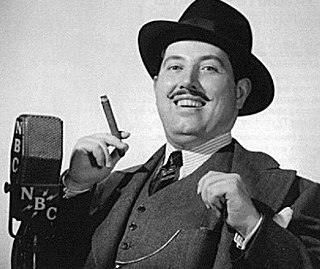
The Great Gildersleeve was a radio situation comedy broadcast in the United States from August 31, 1941 to 1958. Initially written by Leonard Lewis Levinson, it was one of broadcast history's earliest spin-off programs. The series was built around Throckmorton P. Gildersleeve, a regular character from the radio situation comedy Fibber McGee and Molly. The character was introduced in the October 3, 1939, episode of that series. Actor Harold Peary had played a similarly named character, Dr. Gildersleeve, on earlier episodes. The Great Gildersleeve enjoyed its greatest popularity in the 1940s. Peary played the character during its transition from the parent show into the spin-off and later in four feature films released at the height of the show's popularity.

Jane Darwell was an American actress of stage, film, and television. With appearances in more than 100 major movies spanning half a century, Darwell is perhaps best remembered for her poignant portrayal of the matriarch and leader of the Joad family in the film adaptation of John Steinbeck's The Grapes of Wrath, for which she received the Academy Award for Best Supporting Actress. She has a star on the Hollywood Walk of Fame.

Walter Tetley was an American actor specializing in child impersonation during radio's classic era. He had regular roles as Leroy Forrester on The Great Gildersleeve and Julius Abbruzzio on The Phil Harris-Alice Faye Show, as well as continuing as a voice-over artist in animated cartoons, commercials, and spoken-word record albums. He is perhaps best known as the voice of Sherman in the Jay Ward-Bill Scott Mr. Peabody TV cartoons.
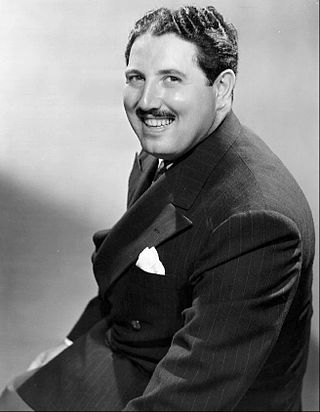
Harold "Hal" Peary was an American actor, comedian and singer in radio, films, television, and animation. His most memorable role is as Throckmorton P. Gildersleeve, which began as a supporting character on radio's "Fibber McGee and Molly" in 1938.
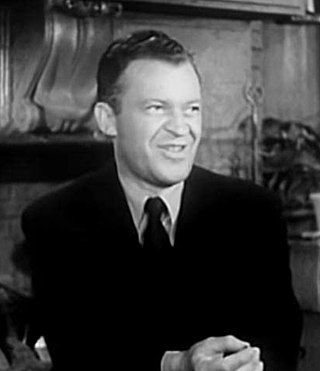
Frank Jenks was an American actor and vaudevillian.

Willard Lewis Waterman was an American character actor in films, TV and on radio, remembered best for replacing Harold Peary as the title character of The Great Gildersleeve at the height of that show's popularity.

A spinoff or spin-off is any narrative work derived from an already existing work that focuses on different aspects from the original work.

Hobart Cavanaugh was an American character actor in films and on stage.

Nancy Gates was an American film and television actress.
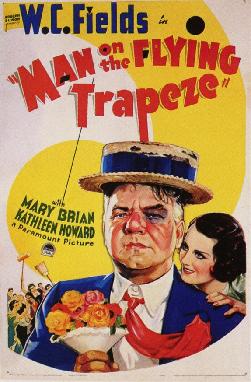
Man on the Flying Trapeze is a 1935 American comedy film starring W. C. Fields as a henpecked husband who experiences a series of misadventures while taking a day off from work to attend a wrestling match. As with his other roles of this nature, Fields is put-upon throughout the film, but triumphs in the end. This was the final film directed by Clyde Bruckman.

Look Who's Laughing is a 1941 American comedy film directed by Allan Dwan It was produced and distributed by RKO Pictures. The film is built around a number of radio stars from the Golden Age of Radio and centers around radio personality Jim Jordan as Fibber McGee from the comic duo, Fibber McGee and Molly, who plans to build an aircraft factory in a small town. Look Who's Laughing was followed by Here We Go Again (1942), with many of the radio stars reprising their performances. It is also known by the alternative title Look Who's Talking.

Here We Go Again is a 1942 American film, a sequel to Look Who's Laughing. With RKO in financial trouble, with the success of the earlier zany comedy starring a bevy of radio stars, Here We Go Again put Fibber McGee and Molly in a search for where to celebrate the couple's 20th anniversary. They want to throw a big party but when everyone declines their invitation, they decide to go on a second honeymoon instead.

The Show-Off is a 1946 American comedy film directed by Harry Beaumont based on the play of the same name by George Kelly. It stars Red Skelton and Marilyn Maxwell. It was previously filmed in 1926 as The Show-Off starring Ford Sterling, Lois Wilson and Louise Brooks and in 1934 as The Show-Off with Spencer Tracy and Madge Evans. Lois Wilson also appeared in the 1934 version, but in a different role.

Gildersleeve on Broadway is a 1943 American film starring Harold Peary as his radio character The Great Gildersleeve. It is the third of four Gildersleeve features, others were The Great Gildersleeve (1942), Gildersleeve's Bad Day (1943), Gildersleeve's Ghost (1944).

Margie Stewart was the official United States Army poster girl during World War II. She appeared on twelve posters, of which a total of 94 million copies were distributed.
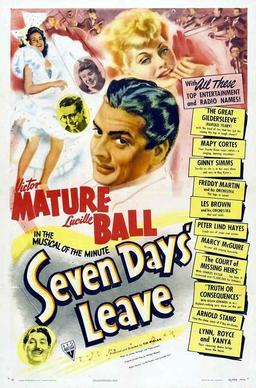
Seven Days' Leave is a 1942 musical comedy about a soldier who has seven days to marry an heiress in order to inherit $100,000.
The Great Gildersleeve is a 1942 American comedy film directed by Gordon Douglas. Based on the popular NBC radio series The Great Gildersleeve created by Leonard L. Levinson, which ran from 1941 to 1950, this is the first of four films in the Gildersleeve series produced and distributed by RKO Radio Pictures. The screenplay was written by Jack Townley and Julien Josephson, and the film stars Harold Peary and Jane Darwell. Other films in the series are Gildersleeve's Bad Day (1943), Gildersleeve on Broadway (1943) and Gildersleeve's Ghost (1944).

Gildersleeve's Ghost is a 1944 American fantasy comedy film directed by Gordon Douglas from an original screenplay by Robert E. Kent. It is the fourth and final film in the Gildersleeve's series, all of which were produced and distributed by RKO Radio Pictures, based on the popular NBC radio program, The Great Gildersleeve, created by Leonard L. Levinson and itself a spin-off of Fibber McGee and Molly. Released on September 6, 1944, the film stars Harold Peary, Marion Martin, Richard LeGrand, Amelita Ward, Freddie Mercer, and Margie Stewart.
References
- 1 2 3 "Gildersleeve's Bad Day: Detail View". American Film Institute. Archived from the original on April 2, 2014. Retrieved September 17, 2014.
- ↑ "The Hollywood Scene: Paramount Buys Story On Radio Short Wave". Motion Picture Daily. January 2, 1943. p. 42. Retrieved May 12, 2016.

- ↑ "Production on Coast Off with 33 in Work". Motion Picture Daily. February 17, 1943. p. 8. Retrieved May 12, 2016.

- ↑ "Production Off with 35 Films Now in Work". Motion Picture Daily. March 17, 1943. p. 5. Retrieved May 12, 2016.

- ↑ "RKO to Tradeshow Four May 3–6". The Film Daily. April 14, 1943. p. 2. Retrieved May 12, 2016.

- ↑ "Exits and Entrances". Oakland Tribune. June 11, 1943. p. 33. Retrieved March 24, 2017.

- ↑ "Reviews of the New Films: "Gildersleeve's Bad Day"". The Film Daily. May 11, 1943. p. 6. Retrieved May 12, 2016.

- ↑ "Reviews: "Gildersleeve's Bad Day"". Motion Picture Daily. May 6, 1943. p. 8. Retrieved May 12, 2016.
